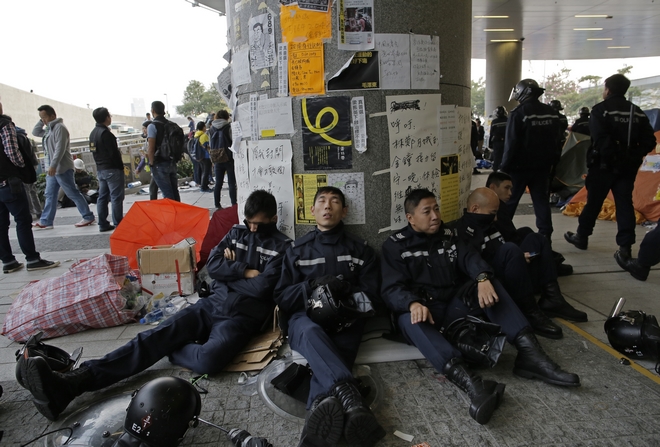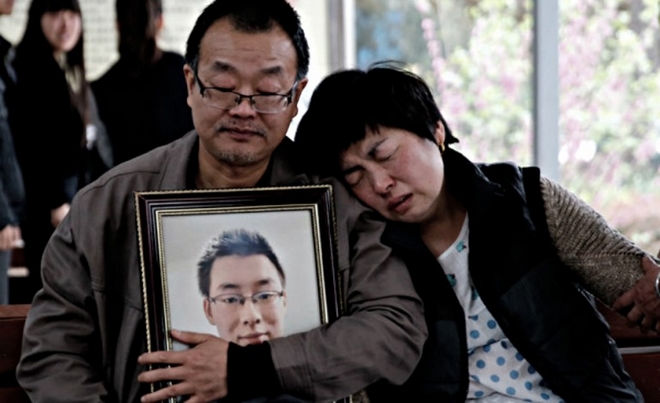The year 2016 saw China's increasing influence in the Western-dominated global governance and assertiveness in the South China Sea regardless of a one-sided arbitration award rejecting Beijing's extensive territorial claims in the waters, through which $5.3 trillion of trade passes each year.
China hosted the much-anticipated G20 summit in the southern Chinese city of Hangzhou, where the world's second-largest economy made its voices heard in discussions about the sustainable development of the world economy, especially in the international fight against the climate change, as China has evolved into one of the world's biggest emitters of greenhouse gases.
Beijing strongly defied the Permanent Court of Arbitration in The Hague after the tribunal ruled in favor of the Philippines in the long-standing South China Sea dispute. The Philippines has long been militarily and diplomatically provocative in the contested South China Sea depending on its alliance with the US, which was rebalancing to the Asia Pacific region. So, the unswerving response against the court verdict sent a clear signal that Beijing was ready to stand up to the US' challenges, which could be reflected in the strengthened deployment of more American warships and military airplanes in the disputed waters of the South China Sea.
On the technical front, the successful launch of the Shenzhou-11 spaceship into space and docking with the Tiangong-2 space lab marked a major step in Beijing's ambitious space program aimed at building China into the only country owning a permanent space station, as the International Space Station's current agreement, which excludes China, is scheduled to expire in 2024.
With foreign companies operating China getting worried about the country's xenophobic policies since Xi Jinping took power in 2012, the Chinese government tendered an olive branch to the foreigners by lowering the green card application thresholds, amid its efforts to build an innovation-driven nation with more global talents. However, many foreigners working and living in China deemed the policy easing to be an empty promise given that only top international professionals could have the opportunity to get the permanent residency permit.
Citizens in the Chinese metropolises continued to be plagued by the enormous increase in housing prices, which was triggered by the policy of reducing the glut of inventory the Chinese government initially adopted for the small cities' real estate markets at the beginning of 2016. The retroaction led the Chinese government to carry out stricter adjustment measures in the fourth quarter. The Chinese government has vowed to curb home prices for many years, but with little effect.
Additionally, a string of social events made a splash in China, as the Chinese people became more attentive to the dark side of the Chinese society. The sensational events included the death of Wei Zexi, a university student who died after taking an ineffective cancer treatment at the Second Hospital of the Beijing Armed Police Corps which Wei's family found via Baidu, the rehabilitation of Nie Shubin, who was executed on the charge of rape and murder two decades ago, and the bizarre act of female college students, who used nude selfies to borrow money on the online lending platforms.
Here is the Sino-US.com's pick of top 10 Chinese events of 2016:
1. China holds G20 summit
Chinese President Xi Jinping hailed the G20 summit, which was held in Hangzhou in September, as a fruitful congregation, because the leaders of G20 member nations reached a consensus on how to get back the already sluggish world economy on the right course. The G20 summit was also the first such meeting that incorporated the UN 2030 Agenda of Sustainable Development into the agenda of the G20 summit, which was praised by UN Secretary-General Ban Ki-moon as a significant push to put forth insights on the sustainable development of the world economy.
Chinese President Xi Jinping delivers his closing statement for the G20 summit in
One of the highlights at the G20 summit was that China and the US, the world's two largest greenhouse gas emitters, announced the ratification of the Paris Climate Treaty, which was widely seen as a great advance in the battle against the climate change. But the future of the international agreement remains uncertain because of US President-elect Donald Trump's vow to pull the US out of the treaty.
The G20 summit was held at a time China is seeking more involvement in the global economic and financial governance, which might allow the country to have a greater say in making the rules for the whole world in the new century. Can China reshape the Western-dominated global governance as the elusive Trump administration is likely to opt for isolationism?
2. China rejects biased ruling over South China Sea dispute
Prior to the release of the ruling on the maritime territorial spat between Beijing and Manila, most Western media had predicted that the Permanent Court of Arbitration in The Hague would reach a verdict against China, which claims large swaths of the South China Sea. But no matter what they predicted, the attitude of the Chinese government did not change.
Beijing strongly rejected the ruling after it was issued in July, defending its territorial sovereignty and maritime rights in the resource-rich waters by citing the UN Convention on the Law of the Sea (UNCLOS).
A satellite image of Chinese land reclamation in the
Tensions over the South China Sea issues partly escalated due to the US' enhanced presence in the area, where it is roping in some claimants for the realization of its pivot to Asia strategy aimed at containing China.
After the issuance of the ruling, Chinese media including the state-backed China Central Television released a barrage of reports and TV programs, which laid bare the ulterior motives behind the ruling, which was called as a "plot" designed by several countries like Japan, which has territorial disputes with China in the East China Sea.
China will not make a concession in terms of sovereignty in the South China Sea, because the adverse effect of a compromise will surely spill over to Taiwan, Xinjiang, Tibet and Hong Kong, where pro-independence forces are making waves.
China rejects South China Sea arbitration award, slams outside powers for interference
3. China launches Shenzhou-11 spaceship
The Shenzhou-11 spacecraft blasted off on October 17 and successfully docked with the Tiangong-2 space lab two days later. Two astronauts stayed in the new space lab for a month, during which the duo tested out the rendezvous and docking technologies that China will need to build a real space station by 2020. It was Chinese astronauts' longest stay in the space lab.
Chinese astronauts Jing Haipeng, left, and Chen Dong wave in front of a Chinese national flag before the launch of Shenzhou-11 manned spacecraft, in
On behalf of the Communist Party of China Central Committee, the State Council and the Central Military Commission, Chinese President Xi made a phone call to send a congratulatory message to the two astronauts from Earth on November 9 (Beijing time), the same day when Trump scored victory in the US presidential election.
In December, the Information Office of the State Council released a white paper charting the blueprint for its space strategy for the next five years. The white paper said that the country is committed to peaceful use of space and opposes a space arms race.
4. The launch of 13th five-year plan
The year 2016 was the first year of the 13th five-year plan (2016-2020), which aims to build China into a moderately prosperous society by 2020, when the GDP and per capita incomes of people in the urban and rural areas will double the 2010 figures, which means China must maintain a 6.5 percent annual growth rate over the next five years.
By 2020, China will also achieve a 60 percent urbanization rate, complete the construction of a self-developed space station and realize the transition to clean energy by placing a cap on coal use.
The 13th five-year plan also puts the innovation-driven growth model on the front burner, pledging to offer favorable conditions to the people eager to start their own business. According to a document jointly issued by the Communist Party of China Central Committee and the State Council in May, China aims to become an innovative nation by 2020, and a world powerhouse of scientific and technological innovation by 2050.
5. Beijing interprets basic law over Hong Kong legislative oath controversy
The Standing Committee of the National People's Congress, China's top legislature, in November made an interpretation of Article 104 of the Basic Law of Hong Kong, after two pan-democratic legislators-elect conveyed pro-independence views at an oath-taking ceremony of the sixth Hong Kong Legislative Council by replacing "Hong Kong Special Administrative Region of the People's Republic of China" with "Hong Kong nation".
Article 104 of the Basic Law of Hong Kong stipulates: "When assuming office, the chief executive, principal officials, members of the executive and legislative councils, judges of courts at all levels and members of the judiciary in the Hong Kong Special Administrative Region must, in accordance with law, swear to uphold the Basic Law of the Hong Kong Special Administrative Region of the People's Republic of China and swear allegiance to the Hong Kong Special Administrative Region of the People's Republic of China."

Police officers rest after protesters tried to break into the Legislative Council in
It is Beijing's fifth interpretation of the Basic Law of Hong Kong since the 1997 takeover. And the defiance of the two newly elected lawmakers against the "one country, two systems" principle is the latest in a series of anti-Chinese mass protests since 2014 when pro-democracy activists launched the Occupy Central movement to demand Beijing to implement universal suffrage for the 2017 chief executive election and the 2020 Legislative Council elections according to the "international standards".
Localism and pro-democracy movement in the former English colony has presented a big challenge for Beijing's bid to unite the country, as more and more Hong Kong people, especially young students, are becoming less loyal to their Chinese roots.
6. Nightmarish real estate market
In 2016, China's real estate market was sequentially trapped in the long-standing vicious circle of uncontrollable rise in housing prices followed by government policies curbing the price hikes. According to data from the National Bureau of Statistics, as of the end of November, the sales volume of China's commercial residential buildings hit a record of 10 trillion yuan.
A sales assistant talks to visitors in front of models of apartments at a real estate exhibition in
During the National Day holiday, the local governments of 22 Chinese cities rolled out a flurry of cooling measures to alleviate fears about a property bubble, whose burst would very likely destroy the slowing Chinese economy.
At a year-end central economic work conference, officials stressed in a statement that "houses are built to be inhabited, not for speculation." But it seems that no one dares to attribute the rising property prices to the local governments who normally see land sales as a major source of their fiscal revenues.
Unregulated private lending inflates China's housing market
Restrictions to cool down real estate market may not be sustainable: developer
China's migrant population bolsters real estate market in central, western China
Supply-side reform key to clearing housing inventory
7. China embraces global talents with eased green card application requirements
At the beginning of 2016, the general offices of the Communist Party of China Central Committee and the State Council issued a document to ease the permanent residency application requirements for foreigners who are qualified in terms of salary, tax payment, business achievement, social reputation and so on.
Later, foreign media reported that the Chinese government would begin a trial run of a new nationwide work permit system in nine cities that would rank foreign workers by A, B, and C grades.
An American applies for permanent residence status in
The policies came as China is transforming from an economy driven by exports and investment to one based on innovation.
There have also been rumors that China is going to establish an immigration agency as the country is becoming more attractive to foreigners.
But in previous interviews with the Sino-US.com, several expats working and living in Beijing for many years labeled those policies lowering the threshold for Chinese green card as "an empty talk", complaining that China is sill one of the major countries in the world with the smallest number of foreigners.
China to lower threshold for green card to attract global talents
Foreign workers in China hold mixed opinions about new work permit system
8. Verdict of man executed 21 years ago reversed
China's Supreme People's Court overturned the verdict on Nie Shubin from northern China's Hebei province who was executed for raping and murdering a woman in 1995, sparking a heated public debate in the social media over the impartiality and transparency of the country's controversial judicial system.

Nie Shubin
In the debate, Sina Weibo users called on the neutral media to play a larger role in supervising China's government and judicial organs in an effort to promote the spirit of the rule of law.
Chinese leadership has reiterated the vow to establish the rule of law in the one-party state.
Weibo reacts to Chinese court's ruling that young man executed 21 years ago was innocent
9. Rough-and-tumble online student lending industry
The chaos of China's online P2P lending industry, which was reflected by Ezubo's collapse in 2015, undermined the student segment in 2016, when female collage students were reportedly asked to send nude photos to loan sharks to borrow money at high interest rates on the online P2P lending platforms, triggering a public call to carry out an industry overhaul to wipe out illegally operated online lenders.
China has announced stricter rules to tighten management of the online P2P lending sector, categorizing P2P platforms as the intermediary agencies that can only provide services including information collection and exchange, credit assessment and matching lenders and borrowers.
Overhaul of China's online lending industry targets student segment
China's gloomy P2P lending awaits impetus from new guidelines
10. Death of college student leads to rules on online advertisements
The death of Wei Zexi, a 21-year-old university student who was diagnosed with synovial sarcoma in 2014 and then had a cancer treatment at the Second Hospital of the Beijing Armed Police Corps which Wei's family found through Baidu, China's leading search engine, triggered a public outcry over the country's medical system and online advertisers' unethical behavior.

Wei Zeixi's parents are holding Wei's picture at his funeral. Photo: Weibo
Baidu was again under fire for advertizing hospitals and medical information without scrutinizing the credentials.
The event forced the Industrial and Commercial Bureau to implement new rules targeting online advertisements. The death of Wei also put under public scrutiny a private hospital chain, known as "Putian-system", which is notorious for charging sky-high prices for treatments and medicines.
Death of college student triggers public outcry over China's medical system
China to issue tighter regulation on online advertising
Putian hospital system, under attack over death of patient, defends itself
| Touched | Sympathetic | Bored | Angry | Amused | Sad | Happy | No comment |